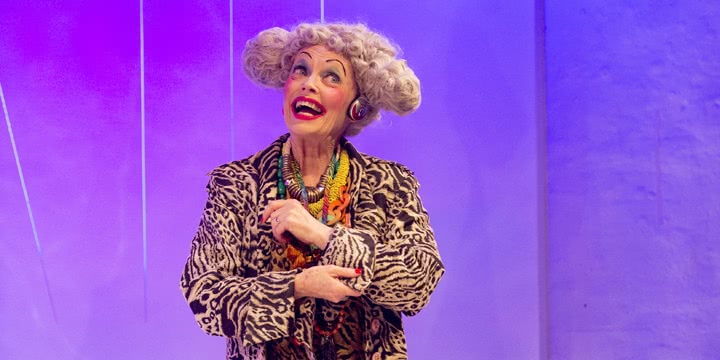“It’s the end of the world as we know it,” Michael Stipe once sang, “And I feel fine.”
A small, smug part of me has always appreciated that cavalier attitude towards the apocalypse – why shouldn’t you take a selfie as we ride this roller coaster into the fire? With the premiere of The Turquoise Elephant, it seems I’m not the only one. This viscous, delightfully dark comedy about catastrophic climate change sounds as hilarious as it is troubling, and as actor Belinda Giblin explains, you’ll laugh, but you’ll probably feel bad about doing so.
“The whole thing is a little circus-like,” Giblin chuckles. “If people are expecting a realistic play, they’re not going to get that. They’re going to find something they have to adjust to really quickly. It’s about the very cataclysmic end of climate change, and we five characters all represent different aspects of that. There is a fatalist, denialist, terrorist, extremist and activist. We’re all a different attitude to the problem. It’s set around 20 years down the road, but it’s a real colourful, loud play.
“My character Olympia is particularly extreme. She is with her sister, Augusta, played by Maggie Dence. We are entitled billionaires who live high up on a hill, far away from rising waters in a kind of secure dome. She follows horror all over the world – she loves that there are islands going under and the last polar bear is drowning in the Arctic. She’s a bit of a ghoul, but she loves it. It’s excitement to her, the way the planet is grasping to survive. She finds that deliciously good fun. She’s a bit like Trump, really. ‘Let’s just see what I can do to destroy things here, it will be fun! I’ll take the others down with me.’ Olympia has no political interest whatsoever, she doesn’t give a stuff. And in that way, she is quite representative of a lot of people in regards to climate change.”
It’s bamboozling that there are still deniers of climate change out in the world when the evidence supporting it is so comprehensive – especially when some of these folk are our elected officials. You can’t scroll through Facebook without seeing another instance of a species being added to the endangered list, or footage showing smog has become sentient in Tokyo, yet the conversation about addressing these near-future concerns somehow never gains great momentum. Playwright Stephen Carleton, following in the footsteps of Eugène Ionesco, has attempted to sneakily get around this obdurance through good old-fashioned entertainment.
“I think when I see theatre, if I know this is a lecture, I stop listening,” Giblin says. “It doesn’t have to be palatable – you don’t need to love the characters in a play. Someone said to me the other day, ‘As long as we feel for each character, as long we like them…’ I don’t agree with that at all! I think you can be a character that people just hate. I don’t think we can make those decisions about character. I do think there is something to like in all of the characters of this play, but a lot of theatre I see, I realise, ‘I don’t have to like this character. It’s not imperative. As long as you make me think!’
“A political play that hits a nerve or has some kind of impact is going to be a good play. The value is that people start identifying where they might sit, and whether or not that is a particularly good position to be in. It challenges people’s political perceptions, it challenges you. I think in political theatre you need to be careful not to become lecturing, and this play certainly avoids that. [But still] it’s a bit scary. I think people like being challenged by political theatre – perhaps slightly destabilised, which isn’t a bad thing.”
Having won the Griffin Award in 2015 for an outstanding play or performance text, The Turquoise Elephant was always going to be an anticipated production. Under Gale Edwards’ direction, this decadent and distressing tale is just the balm to your environmental apathy, and comes with the added benefit of being outrageously, darkly absurd (it also features a rather sneaky appearance from the one and only iOTA).
“People will walk away gasping,” says Giblin. “It could be a didactic bit of polemic, but that doesn’t win people over in arguments. You can identify with [a play] and think it’s rather close to the bone, but here it’s done in a certain circus-like way. So we do it through humour, which is in a funny way more dangerous. People think, ‘Shit, I laughed just then, maybe that was inappropriate.’
“The other thing about this play is it’s very technical. It’s a mixture of Commedia, Restoration comedy; it’s absurdist, larger than life. My character is quite bizarre. If people go thinking they’re going to see a naturalistic play about global warming, they’re going to be quite surprised. There are visuals, sound effects. And Gale Edwards has been such a wonderful director to work with – she has such a vision, and I’ve enjoyed working with her so much.
“We’re going to be very interested to see how people react to the style of the play. I like it because it takes a bit of courage to put yourself out there in this particular production. There’s no way we can be cautious. We have to be brave and bold, and I think that is also true of our audience.”
[The Turquoise Elephant photo by Brett Boardman]
The Turquoise Elephantruns untilSaturday November 26 at SBW Stables Theatre.


































